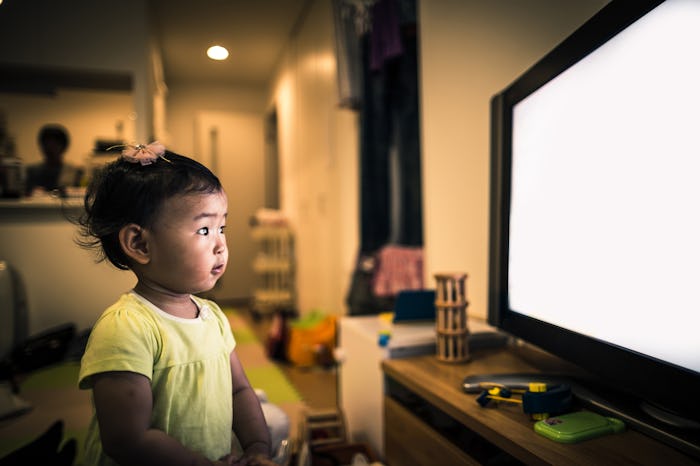Life

Why Your Toddler Gets So Close To The TV Probably Has Nothing To Do With Their Eyes
Toddlers love their screen time and who can blame them? With all the interactive shows, games, and videos out now, the television experience has gone up to a whole new level for our newest generation. But have you ever watched your child get entranced by the TV? You may notice your child habitually sitting or standing right up front. So, why do toddlers stand so close to the TV? If your child does this, could it be a sign of a more serious problem?
I reached out to an expert, Dr. Gina May, who is the author of the blog, Little Dreams Big Chaos and also an optometrist. Dr. May specializes in vision therapy and often gets asked this question by concerned parents. She tells Romper that, luckily, sitting or standing at the TV "is probably one of the least likely symptoms of a vision problem. Young children often enjoy the sensory stimulation of the color and sound and are drawn to that rather than the inability to see." Which makes total sense, right? Can you remember a time when you were a child and you were immersed in a video when all of a sudden your moms yells, "Get back, you're too close!" I know I can. I remember being able to get so close to the television that I could actually see those little rectangular pixels in the screen, which clearly was way before high definition. Imagine the stimulation toddlers experience today when they watch their favorite videos in high def.
But what if you are concerned about a vision problem? While being too close to the TV may not indicate that your child has a problem seeing, Dr. May describes the potential warning signs parents should be looking for when they are concerned about their child's vision. Dr. May says to look for things like "excessive clumsiness or delays with walking and running, rubbing their eyes when [they're] not tired, tilting or turning their head when trying to look at something, or holding a book excessively close to their eyes." For many parents, some of these warning signs will be obvious. If you're still concerned, or your child is demonstrating some or all of these warning signs, don't panic. "A complete eye examination by an optometrist or ophthalmologist is the most certain way of finding hidden eye problems," according to Dr. May. When it doubt, get it checked out.
When it comes to screen time, Dr. May says that parents should be less worried about it leading to long term vision problems and more concerned with excessive screen time leading to eye strain or dry eye, as well as attention and behavioral problems. In fact, more and more doctors are becoming increasingly concerned about screen time. Child psychologist Dr. Nicole Beurkens wrote on her website that screen time can lead to a variety of mental and physical health problems for developing minds. She mentioned how screen time can manifest into sleep issues, mental health issues, physical health problems, and vision problems, along with relational issues, communication problems, and social disconnection. She also noted learning difficulties and academic problems. Yikes. Moderation is key, right?
When it comes to allowing your child to stand too close to the TV, parents should be more concerned with how much television their child is watching instead of how close they are. If you are concerned about a vision problem, always contact your child's doctor to see whether or not they should be tested. Most vision problems can be corrected or improved with glasses, however the more serious problems lie in the behavioral issues that can accompany excessive television viewing. In the meantime, just keep shouting, "Back up from the TV before you go blind" like our parents before us.